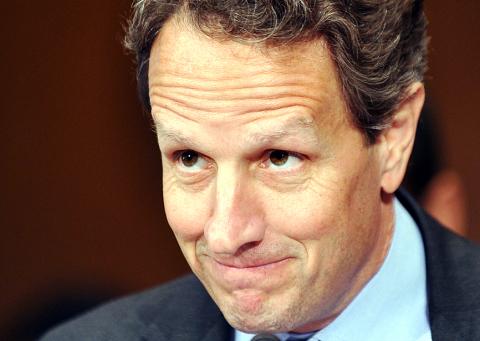Rich nations could tap strategic oil reserves if needed to ward off the risk that Middle East political unrest triggers an inflationary price spiral, US Secretary of the Treasury Timothy Geithner said on Thursday.
In wide-ranging testimony before the US Senate Foreign Relations Committee, Geithner again tweaked China for keeping its currency too low and assured lawmakers he was committed to expanding US overseas trade, while playing down risks that oil prices were a threat to a budding recovery.
He said there was “considerable” spare oil production capacity around the world and “substantial” reserves on hand.

Photo: AFP
“If necessary, those reserves could be mobilized to help mitigate the effect of a severe, sustained supply disruption,” he said.
Political protests have swept through parts of the Middle East and North Africa, sending tremors through markets for fear it could spread to key producers such as Saudi Arabia.
Geithner did not appear to be signaling any short-term intent to dip into US reserves, but rather to make the point that there were options if a lengthy interruption of supplies occurred.
Tapping the Strategic Petroleum Reserve, created in the mid-70s after the Arab oil embargo, is a relatively rare event and it has been US policy to turn to the emergency supply only when faced with a major supply disruption.
The last time it was done was in 2005 following Hurricane Katrina and it drove oil prices down by about 9 percent at the time.
Unrest in oil producer Libya has propelled US crude oil futures above US$100 a barrel in recent days. Crude had traded at about US$86 before protests struck Egypt in late January, the first in a wave of unrest that has encompassed much of the region.
Geithner said the administration of US President Barack Obama was monitoring Middle East developments closely and acknowledged that rising commodity prices — for both food and oil — were causing hardship in many parts of the world by pushing prices up, but he said Americans were feeling less impact.
“In the United States, rising gasoline prices have left consumers with less money to spend, but underlying inflation across all goods and services is modest,” Geithner said.
He also repeated a call for global agreement on “stronger norms for exchange rate policies” to ensure that some countries don’t use an artificially low currency rate to benefit their own economies at the expense of other nations.
“There is broad consensus that the major economies — not just Europe, Japan and the United States, but also the large emerging economies — need to allow their exchange rates to adjust in response to market forces,” Geithner said.
He said the yuan “remains substantially undervalued” and said there has been limited progress in getting Beijing to let it rise in value more rapidly.
The global economy is gradually regaining its footing after three years of crisis, Geithner said, though the pace of growth was uneven and unbalanced.
Geithner pointed to forecasts from the IMF that forecast that emerging-market economies will expand 6.5 percent this year, while Japan and Europe will manage only 1.5 percent growth.
If oil prices stay at about US$110 per barrel, Deutsche Bank economist Peter Hooper estimated it would trim 0.35 percentage points off of US economic output, a moderate hit considering economists expect growth in the 3.4 percent range this year.

The US dollar was trading at NT$29.7 at 10am today on the Taipei Foreign Exchange, as the New Taiwan dollar gained NT$1.364 from the previous close last week. The NT dollar continued to rise today, after surging 3.07 percent on Friday. After opening at NT$30.91, the NT dollar gained more than NT$1 in just 15 minutes, briefly passing the NT$30 mark. Before the US Department of the Treasury's semi-annual currency report came out, expectations that the NT dollar would keep rising were already building. The NT dollar on Friday closed at NT$31.064, up by NT$0.953 — a 3.07 percent single-day gain. Today,

‘SHORT TERM’: The local currency would likely remain strong in the near term, driven by anticipated US trade pressure, capital inflows and expectations of a US Fed rate cut The US dollar is expected to fall below NT$30 in the near term, as traders anticipate increased pressure from Washington for Taiwan to allow the New Taiwan dollar to appreciate, Cathay United Bank (國泰世華銀行) chief economist Lin Chi-chao (林啟超) said. Following a sharp drop in the greenback against the NT dollar on Friday, Lin told the Central News Agency that the local currency is likely to remain strong in the short term, driven in part by market psychology surrounding anticipated US policy pressure. On Friday, the US dollar fell NT$0.953, or 3.07 percent, closing at NT$31.064 — its lowest level since Jan.

The New Taiwan dollar and Taiwanese stocks surged on signs that trade tensions between the world’s top two economies might start easing and as US tech earnings boosted the outlook of the nation’s semiconductor exports. The NT dollar strengthened as much as 3.8 percent versus the US dollar to 30.815, the biggest intraday gain since January 2011, closing at NT$31.064. The benchmark TAIEX jumped 2.73 percent to outperform the region’s equity gauges. Outlook for global trade improved after China said it is assessing possible trade talks with the US, providing a boost for the nation’s currency and shares. As the NT dollar

The Financial Supervisory Commission (FSC) yesterday met with some of the nation’s largest insurance companies as a skyrocketing New Taiwan dollar piles pressure on their hundreds of billions of dollars in US bond investments. The commission has asked some life insurance firms, among the biggest Asian holders of US debt, to discuss how the rapidly strengthening NT dollar has impacted their operations, people familiar with the matter said. The meeting took place as the NT dollar jumped as much as 5 percent yesterday, its biggest intraday gain in more than three decades. The local currency surged as exporters rushed to